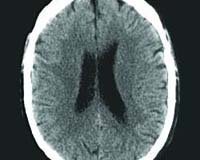| . |  |
. |
Cambridge, England (UPI) Jan 26, 2009 British scientists say they've determined the small brain of Homo floresiensis, a small-brained extinct hominid popularly known as 'the Hobbit,' was normal. The fossils of the hominids were discovered on the Indonesian island of Flores in 2003. Since then, controversy has centered on whether the Hobbits' small brain was actually due to a pathological condition. In the new study, researchers Nick Mundy and Stephen Montgomery of Cambridge University, and colleagues from Durham University, used previously published data from living and extinct species to reconstruct the pattern of brain and body mass evolution in larger primates. "Our results provide robust confirmation for the suggestion that strong evolutionary trends have governed the expansion of the primate brain," Mundy said. "We find that, under reasonable assumptions, the reduction in brain size during the evolution of Homo floresiensis is not unusual in comparison to these other primates. Along with other recent studies on the effects of 'island dwarfism' in other mammals, these results support the hypothesis that the small brain of Homo floresiensis was adapted to local ecological conditions on Flores." The study is reported in the journal BMC Biology.
Share This Article With Planet Earth
Related Links All About Human Beings and How We Got To Be Here
 Yale Team Finds Neural Thermostat Keeps Brain Running Efficiently
Yale Team Finds Neural Thermostat Keeps Brain Running EfficientlyYale CT (SPX) Jan 26, 2010 Our energy-hungry brains operate reliably and efficiently while processing a flood of sensory information, thanks to a sort of neuronal thermostat that regulates activity in the visual cortex, Yale researchers have found. The actions of inhibitory neurons allow the brain to save energy by suppressing non-essential visual stimuli and processing only key information, according to research pu ... read more |
|
| The content herein, unless otherwise known to be public domain, are Copyright 1995-2009 - SpaceDaily. AFP and UPI Wire Stories are copyright Agence France-Presse and United Press International. ESA Portal Reports are copyright European Space Agency. All NASA sourced material is public domain. Additional copyrights may apply in whole or part to other bona fide parties. Advertising does not imply endorsement,agreement or approval of any opinions, statements or information provided by SpaceDaily on any Web page published or hosted by SpaceDaily. Privacy Statement |